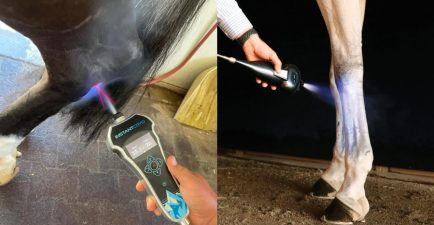Whenever I go through a crisis, I always ask myself, “What can I learn from this experience? What can I do better?”
I’ve learned a few things from my recent broken hand experience: that horses are silly, that hands are fragile, that appropriate pain medication is wonderful, and that good people are even better.
But I’ve also learned a lot about health care, and how phenomenally expensive it is in the United States. This is not new information to me, but I’ve been so fortunate as to not really have anything go exceptionally wrong in my adult life as far as my health is concerned. As a self-employed person, I get my health insurance through the ACA exchange, and I have an extremely high deductible. But since I rarely see a doctor more than twice a year, just for routine care, I hadn’t really given it a thought.
And then this: The surgery to insert two (removable, thank goodness) pins from my hand cost me more than $3,000, cash upfront. The bills have not yet begun to roll in for all of the other visits with specialists, therapists and follow-ups, but I can’t even begin to imagine. I’m sure that they will get close to, but not actually touch my massive deductible. Which means I’m on the hook for the whole hog.
This could have been a phenomenal strain on my resources, something I’d be paying off for a while. And I’m lucky that this is such a minor thing: What if I had done my pelvis, or my spine, or my brain? What if I’d required an ambulance ride or a hospital stay?
But I have something called a Health Savings Account, or HSA, and I think that everyone should have one, especially all of my wonderful 20-something horse girls who should start saving right now, because the reality is that in this business, it’s only a matter of time.
Let me give you the liberal-arts-degree-holder primer on HSAs. They’re a specific type of savings account, available to individuals living in the United States who are on something called a high deductible health insurance plan. For 2020, a high deductible is considered anything more than $1,400 a year, with a maximum out-of-pocket of $6,900 for an individual plan. (As a point of reference, my deductible is more than $7,500.) Like any other savings account, the money inside accrues interest over time and is federally guaranteed, if your HSA is at a commercial bank.
While you can only use the money in an HSA for medical expenses, the money you set aside in one is “pre-tax.” That means you don’t pay income tax on the amount you have earned but put in an HSA. There is a limit on how much you can put in your HSA each year, and if you have a generous employer, they can contribute for you. For 2020, the maximum amount is $3,550. That doesn’t mean you have to put $3,550 in it annually. It just means you can’t put in more than that and get the tax advantage. In my own HSA, which I was given as part of my very first health insurance package after graduating from college and setting out from my family at 21, there have been years where I’ve set aside the maximum amount; there have been years where I put in less; and there have been years, when times were really lean, where I put in nothing at all.
And also unlike regular savings accounts, you don’t pay taxes on the interest, which is obviously meager when there is a small amount in the account, but has the potential to grow over time. In the more than a decade since my account was opened, I’ve got a few hundred dollars of interest, which is free money that I will cheerfully take.What can I do with that money? Pay bills that aren’t covered by my medical insurance but are medical in nature. And here’s where the list is amazing. If I wanted to, I could use it to pay obvious medical things, like my dentist visits, or trips to a chiropractor, neither of which are covered by my insurance. But there’s an incredibly long list of things for which HSA funds are eligible that you wouldn’t necessarily think of, like transportation to doctor visits, medical supplies and more. I personally choose not to use that cash for those things, because I would rather do what I did: let the money pile up and save for The Big One.
And here’s another really cool thing: If there is still money in that account when I turn 65, it becomes a retirement account, much like a regular IRA, so if you stay healthy it’s a way to increase what you can set aside for retirement. You also have an IRA, right? Because you should.
My point is: There’s no downside. And you should absolutely have one. For what it’s worth, my HSA is through a bank called Optum, which I have found very easy to use. To be reimbursed for my surgery, I took a picture of the receipt while sitting in the waiting room preop, and I submitted it via an app. The funds were in my checking account less than 24 hours later. Pretty incredible!
Now if you’re working for a horse trainer, or really anyone, even as a working student, your employer should be paying for a workers comp policy that will cover you in case of a workplace accident. That’s the law, and it is absolutely something you should ask when applying for working student positions because there are a lot of trainers out there who skirt that law by treating their employees as independent contractors. This is illegal and a really good way to leave you screwed if you get hurt.
But my workers comp policy doesn’t cover me, which means that even though this was clearly a job injury, I was out on my own. And while of course a life with horses presents all kinds of risks, we all also have the possibility of being in a car accident, tripping over the curb, or being hit by a falling piano, and the medical bills from such an event could be potentially devastating.
So here’s my PSA: Get an HSA. Seriously. Just do it. Because without mine, I would be in the tall grass over an accident achieved at the walk.
A huge thank you to my awesome attorney, accountant and friend Beth Clarke, who is the best, and who should also be on your radar, horse professionals, because she knows the answers to literally every question about horsey business on earth. She read this over and made sure I didn’t say anything stupid or incorrect. Thanks! (And I know you asked me to be less effusive in my praise but deal with it.)
Original article: https://www.chronofhorse.com/article/a-psa-get-an-hsa


























Comments